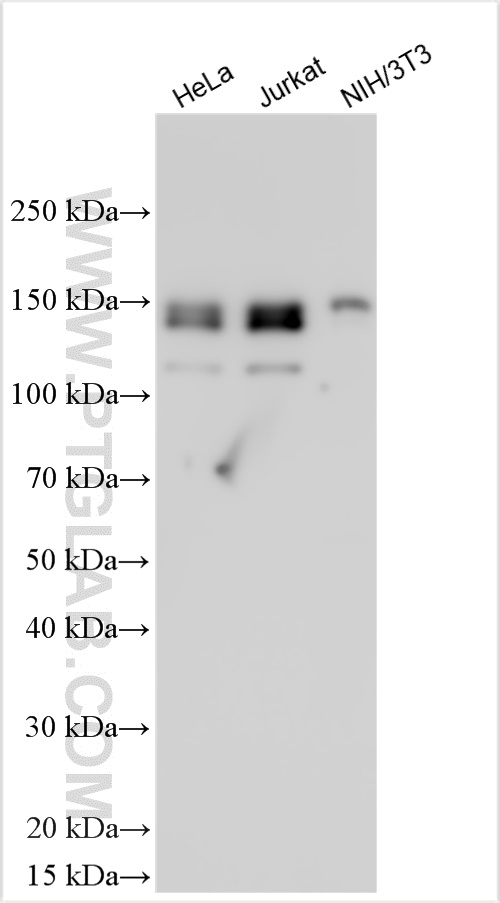验证数据展示
经过测试的应用
| Positive WB detected in | HeLa cells, Jurkat cells, NIH/3T3 cells |
推荐稀释比
| 应用 | 推荐稀释比 |
|---|---|
| Western Blot (WB) | WB : 1:5000-1:50000 |
| It is recommended that this reagent should be titrated in each testing system to obtain optimal results. | |
| Sample-dependent, Check data in validation data gallery. | |
产品信息
31282-1-AP targets FBXO38 in WB, ELISA applications and shows reactivity with human, mouse samples.
| 经测试应用 | WB, ELISA Application Description |
| 经测试反应性 | human, mouse |
| 免疫原 | FBXO38 fusion protein Ag35444 种属同源性预测 |
| 宿主/亚型 | Rabbit / IgG |
| 抗体类别 | Polyclonal |
| 产品类型 | Antibody |
| 全称 | F-box protein 38 |
| 别名 | SP329, MOKA, Fbx38, F box protein 38, F box only protein 38 |
| 计算分子量 | 134kDa,1188aa |
| 观测分子量 | 140 kDa, 107 kDa |
| GenBank蛋白编号 | XM_005268513.1 |
| 基因名称 | FBXO38 |
| Gene ID (NCBI) | 81545 |
| 偶联类型 | Unconjugated |
| 形式 | Liquid |
| 纯化方式 | Antigen affinity purification |
| UNIPROT ID | Q6PIJ6 |
| 储存缓冲液 | PBS with 0.02% sodium azide and 50% glycerol , pH 7.3 |
| 储存条件 | Store at -20°C. Stable for one year after shipment. Aliquoting is unnecessary for -20oC storage. |
背景介绍
F-box containing protein 38 (FBXO38; also known as MoKA) is a substrate receptor for SKP1-CUL1-dependent ubiquitin ligase (SCF). Initially, it was discovered as a modulator of transcription factor Krüppel-like factor 7 (KLF7) activity (PMID: 14729953). In addition, FBXO38 stability is controlled via ubiquitin-specific peptidase 7 (USP7), and FBXO38 protein expression was shown to be required for proper cytokinesis (PMID: 30804394). However, as a ubiquitin ligase, SCFFBXO38 is still insufficiently characterized. So far, the only potential substrate identified is programmed cell death 1 (PD-1) (PMID: 30487606, PMID: 35813202).
实验方案
| Product Specific Protocols | |
|---|---|
| WB protocol for FBXO38 antibody 31282-1-AP | Download protocol |
| Standard Protocols | |
|---|---|
| Click here to view our Standard Protocols |
